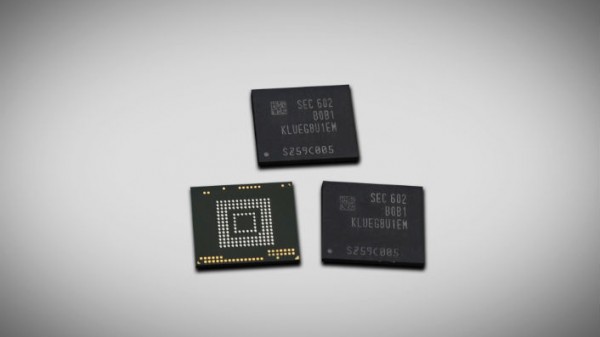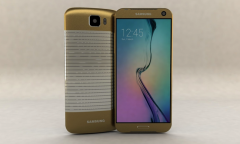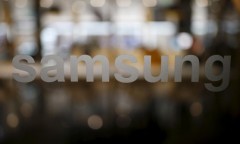By Steve Pak, | February 25, 2016

Samsung 256GB Flash Chip
Samsung's next smartphones could include 256 gigabytes of onboard storage after the Korean conglomerate announced on February 25, Thursday it is mass producing new phone chips. The 256GB flash memory chips for smartphones and other mobile devices use the company's V-Nand technology to make the new memory chips tinier than a microSD card. That can improve applications such as 4K video and virtual reality.
Like Us on Facebook
Samsung claims the new memory is almost two times as fast as the solid-state storage drives on PCS, which is based on the Universal Flash Storage (UFS) 2.0 specs. The new super-fast chips use two lanes of data transfer reaching top speeds of 850 megabytes per second (MBs), according to PCWorld.
The electronics giant claims this will allow smartphone owners to transfer a full HD movie in around 12 seconds using a USB 3.0 cable. "Seamless" ultra HD playback and multi-tasking on big screen devices including tablets will also be supported by the new chip.
In theory this would allow mobile device users to watch a 4K movie and do more basic tasks at the same time. However, there will be other factors including a device's processor.
The top-selling Android phones already have microSD expandable memory, and Marshmallow makes it easier to read/write to expandable storage. However, that does not solve some key issues with Android handsets.
First, the price tag of high capacity flash memory was very high, and the size was too big for old smartphones, according to Gizmodo. Second, it also has worse performance than internal UFS memory.
Android 6.0 basically can treat external memory as internal memory but Samsung and LG do not include the feature in their new phones.
Adding more onboard storage to smartphones is very practical today. That is especially due to the many tasks done by smartphones and tablets including 4K videos and 360-degree virtual reality videos.
Another key issue is that operating systems are getting more complex and require more memory, which can be very demanding for a 16GB device.
In the past even Samsung's arch rival Apple used its flash storage in older iPhone models. However, it is unclear if iPhone 7's storage hardware will also include Samsung products.
Here's a first look at Samsung Galaxy 7/7 Edge:
-
Use of Coronavirus Pandemic Drones Raises Privacy Concerns: Drones Spread Fear, Local Officials Say

-
Coronavirus Hampers The Delivery Of Lockheed Martin F-35 Stealth Fighters For 2020

-
Instagram Speeds Up Plans to Add Account Memorialization Feature Due to COVID-19 Deaths

-
NASA: Perseverance Plans to Bring 'Mars Rock' to Earth in 2031

-
600 Dead And 3,000 In The Hospital as Iranians Believed Drinking High-Concentrations of Alcohol Can Cure The Coronavirus

-
600 Dead And 3,000 In The Hospital as Iranians Believed Drinking High-Concentrations of Alcohol Can Cure The Coronavirus

-
COVID-19: Doctors, Nurses Use Virtual Reality to Learn New Skills in Treating Coronavirus Patients











